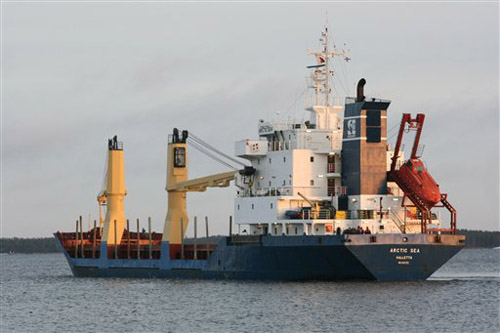Moscow - There were… Click HERE to read the full blog article.
It is worth departing from emotions and taking a view of the facts. They explain the essence of the matter more expressive than something other.
Firstly, the practical international standards provide for obligatory observance of navigation rules. A vessel may not put out to sea if it is technically defective. And if this is the case, then all the life-support systems of the Arctic Sea were in working condition. The ship just could not have put to sea, if communication, navigation, electrical equipment and other systems were not functioning.
That is why the “radiosilence mode” of the Arctic Sea could begin only in consequence of “external” factors influence. And these factors are more probably of a criminal nature. Because it is no mere chance that the captain of the ship Sergey Zaretsky could send only one SMS-message, the content of which is yet more proof that the sender’s actions were controlled.
Secondly, any ship putting out to sea undergoes obligatory customs, border and other kinds of control. The party making such actions, in case of detection of smuggled and other nondeclared goods is obliged to immediately notify the parties owning the goods and its carrier. Furthermore, measures provided by international regulatory legal acts should be taken.
However Finland did not notify the Russian party of the Arctic Sea crew’s arrest or smuggled goods on shipboard. That is why there is every reason to believe that the cargo was completely corresponding to the declared consignment notes, and there were no “classified materials” transported by the crew. The version of a “classified goods” falls apart at the seams in this case too.
Thirdly, there is a standard world practice according to which in force-majeure circumstances a ship owner is obliged to immediately notify public authorities in conformity with applicable rules.
But it was not done. This brings up just questions: “Why the ship-owner, whom the Arctic Sea belonged, did not find it necessary to inform the Russian party of the above circumstances? What are motives of his behavior? Whom was he lead by?” There remains a lot of questions, but investigation will give answers to them. However it is evident that in this situation the crew became hostage of its owners or their protectors. Of those, who are trying now to shift the blame for what has happened onto the Russian authorities and crew.
Fourthly, according to working rules of the maritime law, any party, discovered a lost vessel or a vessel in distress, is obliged to render all necessary assistance in these cases and to inform the party owning the transport.
And not all is plain sailing in this question as well. It perplexes that the sailing near the Arctic Sea vessels under the flags of Sweden, France, Great Britain and other states did not wish to interfere in this situation settlement.
NATO combat ships’ “position of inaction” in relation to transportation of “secret and insecure”, according to some information agencies, materials also remains unclear. Otherwise, how can be considered the fact that a ship, allegedly transporting “dangerous materials”, “weapon” and other “secret materials”, was sailing to a point of its destination without hindrance.
And references to possible lack of information about nature of goods of the leading world powers intelligence services, as well as to impossibility to establish the Arctic Sea’s location are at least unfounded and invite a number of questions.
Fifthly, according to the accepted rules, any civil vessel has a name or a certain number. Number is changed in accordance with established procedure, in specially designated areas.
In the case with the Arctic Sea the following happened. During its detention by the Russian ship Ladny, trying to disorient naval mariners, the captain of the dry cargo ship Arctic Sea went on the air and reported on his belongings to the flag of the Democratic People’s Republic of Korea. At that he called false name of the vessel JON JIN 2 and its sailing route Havana-Sierra Leone, with cargo of palmtrees, as well as his IMO 8018912 number.
During inspection of the ship by naval mariners it was found out that the name JON JIN 2 had been applied with a fresh coat of paint over the name Arctic Sea.
Thus, there are too unsolved questions, but the major of them is the following: “Who was to profit by this action, who is behind the outright cynical provocation, what is the real goal?” It is obvious that the fuss is directed to weakening the role and influence of the Russian Federation in the international arena, blowing to its political leadership’s prestige.
